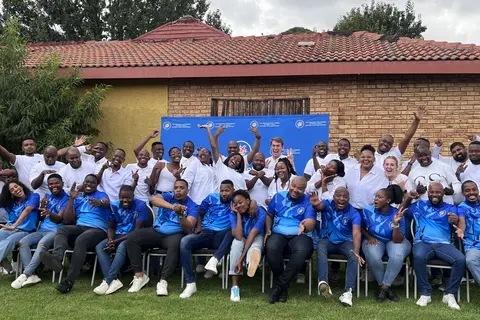Defying culture
Written , Family , Culture“I was holding his hand and telling him stories and then he just slipped away,” says Nellie Myburgh (52), whose husband died when she was 34.
When she was 19, she buried her father, watched her heartbroken mother be bullied by her in-laws, and was swallowed whole by depression.
Over the next few years, as she lived in the towns of Mzuzu and Mzimba, in northern Malawi; life would have more body blows for Nellie.
A perfect life disturbed
In 2000, Nellie was married and mom to two young children, Harvey Jnr and Yankho. She was trying to finish another round of degrees and her husband, Harvey Kabwazi, was a professor at the University of Malawi.
Things were good for the young couple but Harvey battled with diabetes. In March that year Harvey was admitted to hospital when he started feeling ill. It was serious.
And then he slipped away.
His death seemed like the cruel wheel of life had rewound to her mom’s life. The terrible memories of losing her beloved father came crashing back. Immediately after Harvey’s death the young widow was accused by her in-laws of poisoning her husband. Nellie was chastised for not following the traditions of mourning and her in-laws took all her belongings – the same way her mother’s in-laws had done to her. All the while Nellie was worrying about the future of her two small children and grieving for the man she loved from when she met him as a 20-year-old.
Defying culture
“When Harvey died I was busy finishing my master’s, but I just didn’t want my life to continue, the grief was very painful,” she remembers.
The final straw came when her mother-in-law sent for her, demanding Nellie care for her. Nellie found the courage to break with culture and flat-out defied her.
“I am the eldest of 11 children and we were 10 girls and one boy. Growing up my father always told me that I could do anything, and the only difference between me and a boy was that I wore dresses and boys wore trousers.
“Since then, I knew I had to fight injustice. I saw how rituals were used to break my mother and to cause her so much unnecessary pain. They forced her to shave her head, to sit at the corner of a room and to wake up to cry for 40 days when my dad died,” she says.
She adds: “This is not about culture and it’s not about the traditions you hold, it’s about fairness. If your culture is pulling you down, you must fight it.”
And so she told her mother-in-law that she respected her as the grandmother to her children, but she was no longer her daughter-in-law and she walked away.
It would be many months later that she slowly pieced bits of her life together. She finished off her studies that have spanned dairy science, nutrition and anthropology. She looked in on her mom and younger siblings as she’d always done, and all the while, she nursed her heart.
Finding love again unexpectedly
Then in 2002 she met Albert Myburgh through one of her sisters. Albert, a South African business analyst, was working as a consultant in Malawi and was a colleague of Nellie’s sister, Elsie. A year would pass before they met again and then their love blossomed. Albert divorced his South African wife and he and Nellie said “I dos” to each other a year later.
“I wasn’t expecting to remarry or to fall in love again,” says Nellie, today the head anthropologist at the Wits University Health Consortium.
But she learnt that after death there is life and from loss can come love. She also learnt that traditions can be made and remade, and culture should not be a shackle. Indeed, she and Albert have challenged bigotry, marrying as a mixed-race couple and settling down in suburban Johannesburg in 2007. They have a 12-year-old daughter, Mary-Ann, and have six children between them.
To add to Nellie’s joy, her mother, Helen, has also been able to thrive again. In 1989 when a friend was dying of Aids, Helen took in her baby. As the Aids epidemic raged on in Malawi, more babies arrived at her door. Despite still having the youngest of her own children to look after, Helen didn’t turn away a single child. Eventually she went on to establish a children’s home. Today she’s retired from the home but continues to work for causes close to her heart.
“Mom was so loved by my dad but that love ended. Still she’s so compassionate, and she always tries to include everyone. She’s a builder, she’s always humble and she’s very real,” says Nellie.
Nellie and her mother found themselves on similar dark paths as young widows. They’ve had to let time heal, then trust that one faltering foot in front of the other can start the journey towards new joy and new purpose.
Pictures: Chris Collingridge
Story by Ufrieda Ho
Featured






